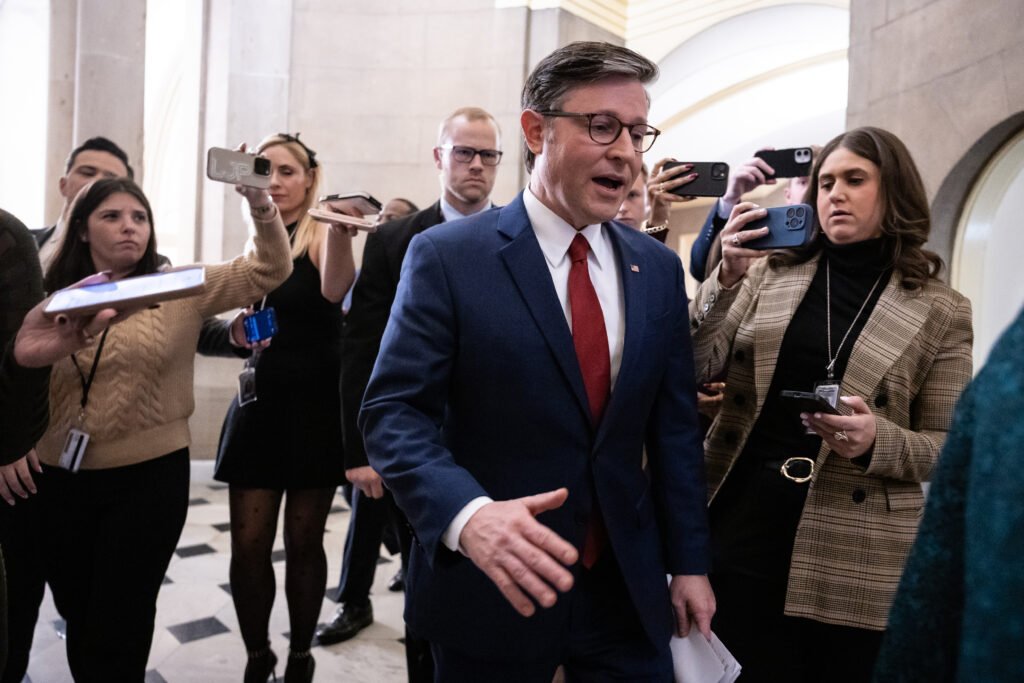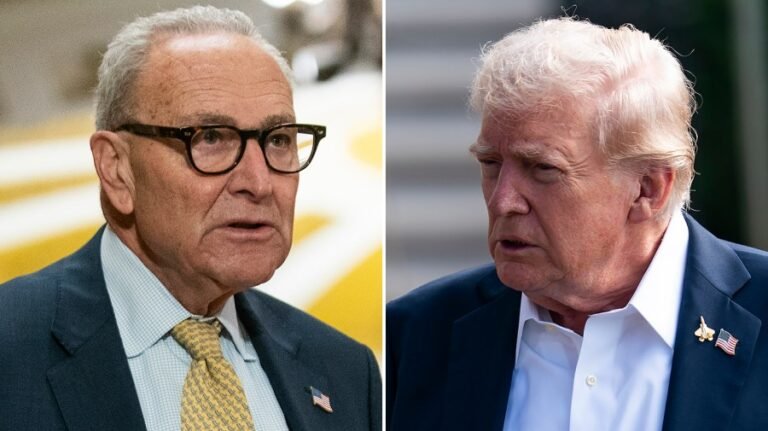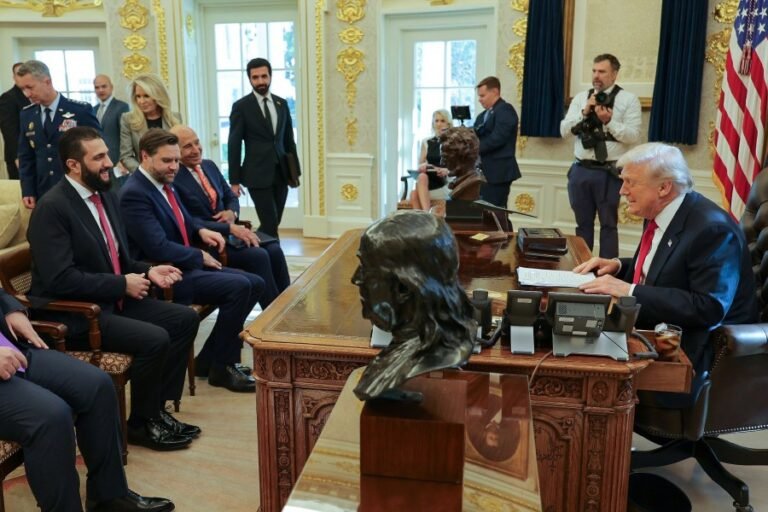
The House is set to return to work Wednesday after a staggering 54 days out of session. Ending the record government shutdown will be the least of Speaker Mike Johnson’s problems.
Tensions have been running high for weeks over Johnson’s decision to shut down the House for the duration of the shutdown, sparking intense criticism from Democrats and private alarm inside pockets of the House GOP.
With members now returning to Washington after spending nearly two months dispersed across the country, he is faced with jump-starting dormant committee work, tackling a looming health care deadline and resolving long-brewing internal conflicts over the late sex offender Jeffrey Epstein and congressional stock-trading — if he can reopen the government first.
Asked Monday if he had the votes to pass the Senate-negotiated package, Johnson replied, “I think we will,” as he dashed into his office.
Johnson is already leaning heavily on President Donald Trump to get his conference behind the funding package. He made clear on a private call with House Republicans Monday morning that Trump wants the government reopened as soon as possible, and Trump signaled later in the day that he backs the deal.
GOP hard-liners who have traditionally opposed spending bills appear to be falling in line, arguing that the package constitutes a major win because it preempts a year-end omnibus bill that would fund the whole federal government through September and does not extend expiring Affordable Care Act insurance subsidies, as Democrats had demanded.
Even the famously intransigent House Freedom Caucus “is cool” with the package, according to one Republican in the group who was granted anonymity to discuss internal dynamics. Their support solves one of Johnson’s biggest headaches and puts the bill on a glide path to passage, with Trump ready to cajole any other holdouts.
The bigger challenge might be getting members to Washington for a final vote. They’re likely to face massive travel disruptions this week with FAA flight limits prompting airlines to trim thousands of domestic flights. Johnson urged GOP members Monday to begin traveling to Washington as soon as possible. Chiefs of staff also received a notice Monday morning for lawmakers to return to Washington by Tuesday evening, and be ready to vote Wednesday.
Once lawmakers arrive and reopen the government, Johnson will then have to confront other long-simmering controversies.
One issue he plans to confront immediately Wednesday, before the first House votes, is swearing in Democratic Rep.-elect Adelita Grijalva seven weeks after she won the special election to fill her late father’s Arizona House seat, according to five people granted anonymity to discuss his plans ahead of an official announcement.
But that in turn will jump-start another long-running GOP political hassle: Grijalva says she will be the 218th and decisive signature on a discharge petition to compel the release of the “Epstein files” — records held by the Justice Department that Trump has opposed sharing. That will start a cascade of legislative steps requiring the measure to be brought to the floor by early December.
Republican leadership has taken pains to avoid Epstein-related votes, which have generated fissures inside the GOP, but Johnson has said he won’t seek to block the discharge petition.
Separately, many members of both parties are pushing Johnson to advance a contentious bill that would ban lawmakers from trading individual stocks. Appropriators will also face the daunting task of drafting full-year spending bills for most of the federal government ahead of the new Jan. 30 shutdown deadline. And lawmakers on other committees will be forced to catch up on weeks of missed hearings and markups, with GOP leaders privately warning members that many late nights of work are in store upon their return.
The toughest internal battle Johnson will have to confront centers on health care. A brewing conflict over the expiring Obamacare subsidies — which the speaker was mostly able to keep under wraps with members out of town — is now set to spill out into the open in the coming days.
On one side, scores of Republicans are dead-set against extending the subsidies that have been at the center of the shutdown. On the other side, Johnson is facing a handful of unhappy GOP members, including some who are privately considering backing any discharge petition to sidestep Johnson and force a vote on an extension before the Obamacare tax credits expire Dec. 31.
“We will find a way,” said one House Republican who supports an extension and was granted anonymity to speak frankly about internal dynamics. Johnson told House Republicans on their Monday call that he is not committing to hold any vote on extending the subsidies. Asked later by reporters, he said only that there would be “a deliberative process.”
Across the aisle, he will be facing down over 200 angry Democrats who are already strategizing about how to turn their disappointment over the shutdown’s apparent anticlimactic ending into political advantage.
House Democrats will likely be unable to block the legislation to reopen the government this week, and many are fuming about what happened in the Senate.
Gathering on a private call Monday afternoon for their first party discussion since the Senate deal came together, members vented their anger about the eight Democratic and independent senators who broke ranks to advance the funding bill, according to five people granted anonymity to describe the discussion.
House Minority Leader Hakeem Jeffries took steps to cool the internal tensions, offering support to his Senate counterpart, Chuck Schumer, amid a fiery backlash Monday.
“Leader Schumer and Senate Democrats over the last seven weeks have waged a valiant fight on behalf of the American people, and I’m not going to explain what a handful of Senate Democrats have decided to do,” he told reporters Monday.
He and other Democrats are trying to refocus attention on extending the health care subsidies, with Jeffries telling fellow Democrats on the private call he would pursue all options to force action, including a new discharge petition, the people said. Democrats believe enough House Republicans are willing to cross Johnson and circumvent his leadership, though the House might not be able to act quickly enough to prevent a massive hike in Americans’ health insurance bills in the coming months.
Democratic leaders are expecting their members to vote en masse against the Senate deal and are expected to formally recommend a “no” vote. But one centrist House Democrat granted anonymity to comment on internal discussions said at least a handful of colleagues are expected to vote for the funding package this week.
A spokesperson for the only Democrat to vote for a GOP-led stopgap spending bill ahead of the shutdown — retiring Maine Rep. Jared Golden — said his “position on using a government shutdown as a legislative strategy has been clear and has not changed.”
Golden also said he has “spent months having bipartisan conversations about how to build the support necessary to extend the ACA credits” and “looks forward to continuing those conversations with his colleagues in the days to come.”


